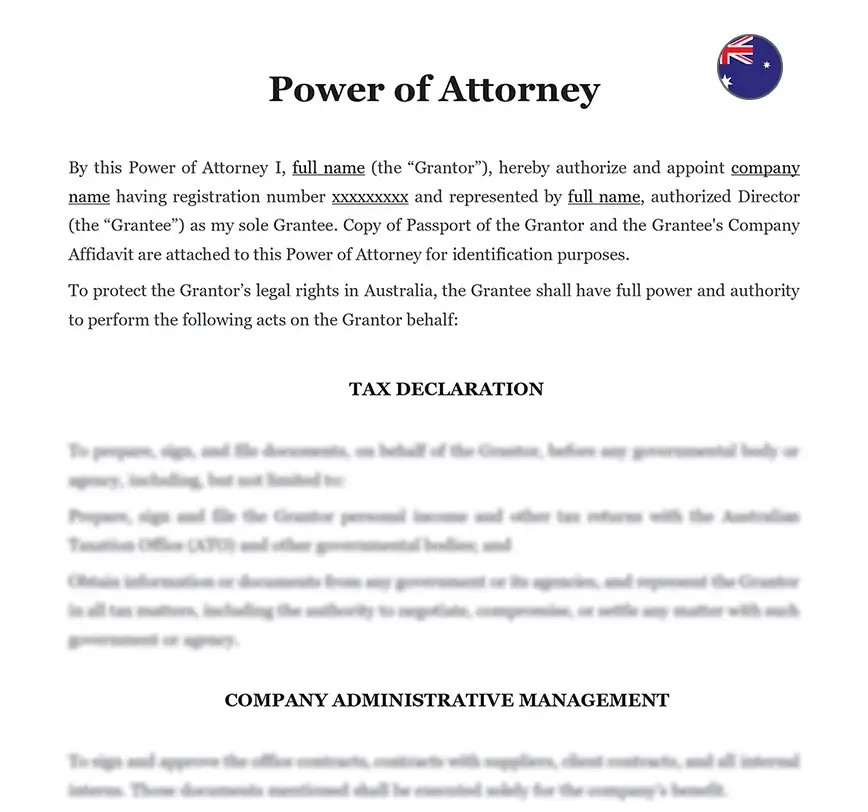Ready to use legal template
Drafted by lawyers
Compliant with Australian law
Home › Business contracts › Power of attorney
Learn more about Power of Attorney in Australia
A Power of Attorney is a legal document that authorises another person, to act on your behalf in personal, financial, or legal matters. It is commonly used when you are unable to manage your affairs due to absence, illness, or incapacity. In Australia, there are different types of Powers of Attorney, including general and enduring, each serving distinct purposes depending on the situation. Having a Power of Attorney in place is an essential part of future planning, as it ensures that your decisions are made by someone you trust and in accordance with your instructions. At Themis Partner, we offer a professionally drafted Power of Attorney template designed specifically for use in Australia. It’s easy to edit in Word format, allowing you to tailor it to your needs. Download your copy today and take control of your personal and financial future.
Table of contents
-
What legal requirements must be met for a Power of Attorney to be valid in Australia?
-
How does a Power of Attorney designate authority and responsibility?
-
What types of powers can be granted through a Power of Attorney?
-
Are there specific limitations or restrictions on the powers granted in Australia?
-
What role does a Power of Attorney play in managing financial affairs?
-
Can a Power of Attorney be used to make healthcare decisions in Australia?
-
What legal considerations should be kept in mind when drafting a Power of Attorney?
What legal requirements must be met for a Power of Attorney to be valid in Australia?
In Australia, several legal requirements must be met for a Power of Attorney (POA) to be considered valid. Firstly, the principal (the individual granting the authority) must have legal capacity, meaning they must be of sound mind and over the age of 18. Additionally, the POA document must be in writing and signed by the principal in the presence of at least two adult witnesses who are not beneficiaries under the POA. These witnesses must also sign the document to acknowledge the principal’s signature. Moreover, depending on the jurisdiction, the POA may need to be registered or notarized to be legally enforceable. Compliance with these requirements ensures that the POA is valid and legally binding.
How does a Power of Attorney designate authority and responsibility?
A Power of Attorney in Australia designates authority and responsibility by appointing an attorney-in-fact or agent to act on behalf of the principal in specified matters. The principal grants the attorney-in-fact the authority to make decisions and take actions on their behalf, which can include managing financial affairs, entering into contracts, making legal decisions, and handling property matters. The scope of authority granted to the attorney-in-fact is defined in the POA document, which outlines the specific powers conferred and any limitations or restrictions imposed by the principal. By designating an attorney-in-fact, the principal can ensure that their interests are protected and their affairs are managed effectively in their absence or incapacity.
What types of powers can be granted through a Power of Attorney?
In Australia, a Power of Attorney can grant various types of powers depending on the needs and preferences of the principal. Some common types of powers that can be granted through a POA include:
1. General Power of Attorney:
Provides broad authority to the attorney-in-fact to manage the principal’s financial and legal affairs, typically for a specified period or until revoked by the principal.
2. Enduring Power of Attorney:
Continues to be effective even if the principal becomes incapacitated or unable to make decisions. It can cover both financial and personal/healthcare matters, depending on the jurisdiction.
3. Limited or Specific Power of Attorney:
Grants specific powers or authority for a particular purpose or transaction, such as selling property, managing investments, or making healthcare decisions.
4. Medical Power of Attorney or Advance Healthcare Directive:
Authorizes the attorney-in-fact to make healthcare decisions on behalf of the principal if they are unable to do so themselves due to illness or incapacity. This type of POA is often combined with an advance directive to provide instructions regarding medical treatment preferences.
By choosing the appropriate type of POA and specifying the powers granted, the principal can ensure that their affairs are managed in accordance with their wishes and best interests.
Are there specific limitations or restrictions on the powers granted in Australia?
While a Power of Attorney in Australia grants significant authority to the attorney-in-fact, there are specific limitations or restrictions that may apply depending on the jurisdiction and the type of POA executed. Some common limitations or restrictions on the powers granted by a POA include:
| ➤ Specific powers: The principal may choose to grant only specific powers to the attorney-in-fact while retaining control over other matters. |
| ➤ Duration: The POA may be valid only for a specified period or until a certain event occurs, such as the principal's incapacity or death. |
| ➤ Revocation: The principal retains the right to revoke or terminate the POA at any time, provided they have legal capacity to do so. |
| ➤ Legal requirements: The POA must comply with legal requirements, including the formalities for execution and any registration or notarization requirements, to be valid and enforceable. |
| ➤ Fiduciary duties: The attorney-in-fact must act in the best interests of the principal, adhere to any instructions or limitations specified in the POA, and avoid conflicts of interest or self-dealing. |
| ➤ Court oversight: In some cases, particularly with enduring powers of attorney, the court may exercise oversight to ensure that the attorney-in-fact is acting in accordance with the principal's wishes and interests. |




